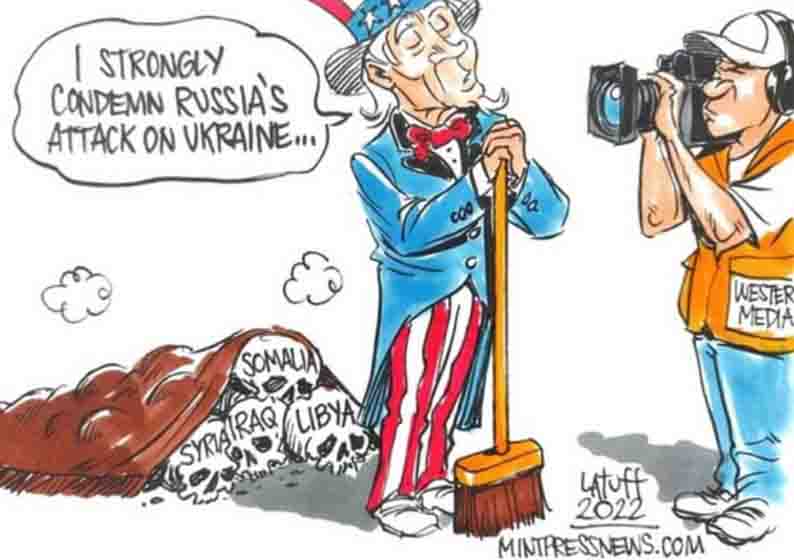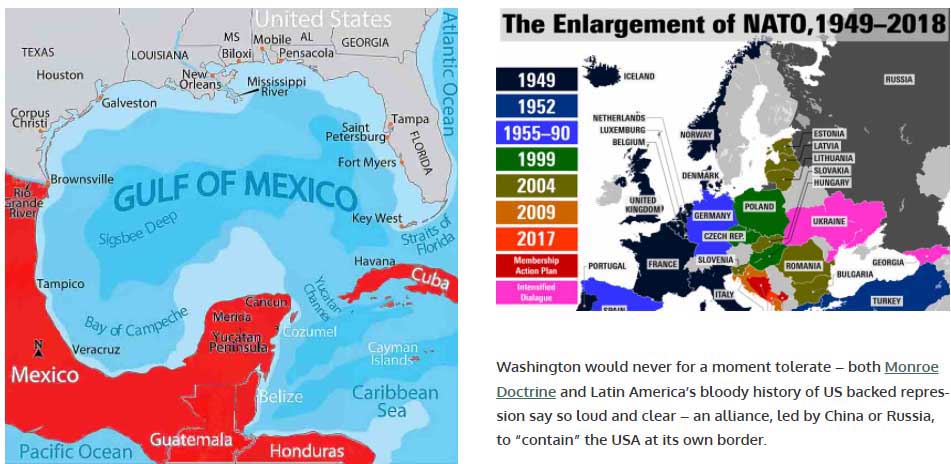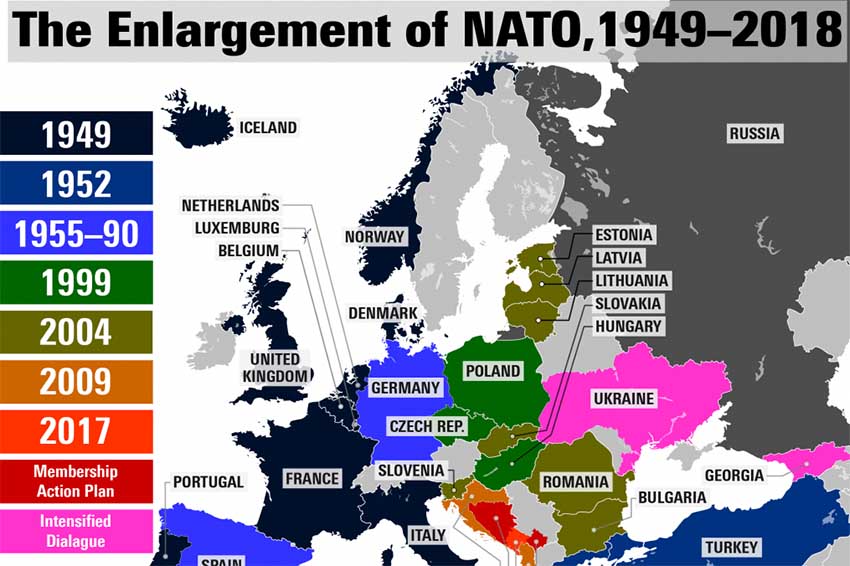
The U.S. information war arsenal is unmatched because it controls the Internet and its main gatekeepers of content such as Google, Facebook, YouTube, Twitter, Wikipedia… It means the U.S. can exercise control over the noosphere, that “globe-spanning realm of the mind” that RAND 1 was already presenting as integral to the US information strategy. For this reason no government can ignore the profound impact of the Internet on public opinion, statecraft and national sovereignty. Because neither Russia nor China can beat the U.S. in a game where it holds all the cards, the smart thing to do is to leave the gaming table, which is exactly what both powers are doing, each drawing on its specific strengths.
Laura Ruggeri
Here’s the ‘international community’ we hear of so often. The one which deplores human rights abuses – and aggressions psychologised, to skirt the perils and inconveniences attendant on accounts more materially grounded – in countries which, by a remarkable coincidence seldom remarked on, just happen to be the ones defiant – or simply in the way – of Washington fiat.

The much cited International Community
Three months ago this international community’s corporate media – having told us for decades that Russia is an Evil Empire (there’s projection for you, given a global south still impoverished after 500 years of northern beneficence, and decades of dollar hegemony backed by US bases circling the planet 2 ) – stepped up the intensity of that message. To question it is to be a Putin troll …
(I’m neither admirer nor detractor of the man. I can’t get reliable info to make the call, though I note vastly improved living standards for Russians once he’d succeeded Yeltsin. In any case I’m more concerned with the most blood-soaked nation ever – the only one to have used nuclear weapons, to have slaughtered millions in this century alone, to have an arms budget exceeding that of the next ten nations combined and (another of those remarkable yet seldom remarked on coincidences) an economy driven by its military-industrial complex – triggering a very short WW3; after which, as Nikita Kruschev once put it, the survivors will envy the dead …)
… just as questioning a wall to wall Syria narrative made you an Evil Assad apologist. See the pattern? Damascus ran a form of partial state capitalism, Ba’athism, anathema to neoliberal globalism. As did Gaddafi’s Libya and Saddam’s Iraq. In each case the offences against Wall Street had specific elements – The Wrong Pipeline in Syria … a threat to ditch petrodollars in Libya – but all posed multi-faceted obstacles to the will of Washington. I don’t say these states were perfect – far from it 3 – but (a) we can now compare the life quality of Iraqis and Libyans before and after the West’s ‘humanitarian’ interventions, and (b) there’s a two word answer – Saudi Arabia 4 – to the fanciful notion that these states were targeted for their despotism and human rights record.
But back to Russia in Ukraine. I’ve spent two months trying to draw attention to twin elephants in the room. One is that Russia never wanted to invade, while Washington did all it could to force her hand; the other that Russia’s demands are just and reasonable …

… while Washington’s denial of them – and please don’t insult my intelligence or debase your own by telling me Mr Zelenski has a shred of agency here – is an act of self-serving criminality with thermonuclear potential.

The Economist, April 1, 2022
Those in the ‘international community’ who see these truths are vanishingly few. Yet the facts are indisputable. Declassified documents released in 2017 show that Gorbachev was indeed promised, in the run up to German reunification, that NATO would not expand eastwards. That it did so expand cannot be concealed. Wholesale trashing – including by an academia almost as corrupted by market forces as corporate media are – of all and any talk of promises to the contrary is therefore needed. Try an online search – did NATO promise not to expand east? – and you’ll get site after self anointed ‘fact checker’ site assuring you that this is a myth. Yet the evidence is irrefutable, the case cast iron.
(Though in truth that promise, severally made and repeatedly broken, is not strictly needed. On the one hand the Monroe Doctrine, 5 on the other US subversions of democratic will across the global south at large and Latin America in particular, show the Washington led push eastwards to be as arrogant and hypocritical as it is life-on-earth threatening.)
So if the facts overwhelmingly support those of us standing against the narrative, infantile but deafening, of a Russian bear battering gallant Ukraine, why are we in such a minority? That’s no trifling question given the stakes.
Cue for Laura Ruggeri – academic profile here, journalist portfolio here. In her splendidly lucid piece for Strategic Culture, she not only answers this question at multiple levels, while drawing out the significance of another of Moscow’s demands: the ‘denazification’ of Ukraine. She also shows how China and Russia have both withdrawn from a theatre – info-warfare – in which a US determined to see off any economic challenge by fair means or foul enjoys an unassailable lead.
The better to compete on other terrain.
For China this means, for now at least, Belt and Road. For Russia, cornered and repeatedly snubbed, it means fighting – again – for survival as a truly independent state …

… on the very terrain through which Hitler, like Bonaparte before him, had struck at her.
*
Is Russia losing the information war?
On March 10 when CIA director Bill Burns addressed the U.S. Senate and declared “Russia is losing the information war over Ukraine”, he repeated a claim that had already been amplified by Anglo-American media since the start of Russia’s military operations in Ukraine. Though his statement is factually true, it doesn’t tell us why and mainly reflects the West’s perspective. As usual the reality is a lot more complicated.
The U.S. information warfare capability is unparalleled: when it comes to manipulating perceptions, 6 producing an alternate reality and weaponizing minds, the U.S. has no rivals. The U.S. coercive deployment of non-military instruments of power to bolster its hegemony, and attack any state that challenges it, is also undeniable. And that’s precisely why Russia was left with no other option than the military one to defend its interests and national security.
Hybrid warfare, and information warfare as an integral part of it, evolved into standard U.S. and NATO doctrine, but it hasn’t made military force redundant, as proxy wars demonstrate. With more limited hybrid warfare capabilities, Russia has to rely on its army to influence the outcome of a confrontation with the West that Moscow regards as an existential one. And when your existence as a nation is at risk, winning or losing the information war in the Western metaverse becomes rather irrelevant. Winning it at home and ensuring that your partners and allies understand your position and the rationale behind your actions inevitably takes precedence.
Russia’s approach to the Ukraine question is remarkably different from the West’s. As far as Russia is concerned Ukraine is not a pawn on the chessboard but rather a member of the family with whom communication has become impossible due to protracted foreign interference and influence operations. According to Andrei Ilnitsky, an advisor to the Russian Ministry of Defence, Ukraine is the territory where the Russian world lost one of the strategic battles in the cognitive war. Having lost the battle, Russia feels all the more obliged to win the war – a war to undo the damage to a country that historically has always been part of the Russian world and to prevent the same damage at home. It is rather telling that what U.S.-NATO call an “information war” is referred to as “mental’naya voina”, that is a cognitive war, by this prominent Russian strategist. Being mainly on the receiving end of information/influence operations, Russia has been studying their deleterious effects.
While it is too early to predict the trajectory of the Russia-Ukraine conflict and its political outcomes, one of the main takeaways is that the U.S. employment of all instruments of hybrid warfare to instigate and fuel this conflict, left Russia no alternative than the recourse to military power to solve it. You can’t win the battle for hearts and minds when your opponent controls them. You first need to restore the conditions that will make it possible to reach them and even then it will take years to heal wounds, undo the psychological conditioning.
Though disinformation and deception have always been a part of warfare, and information has long been used to support combat operations, within the framework of hybrid warfare information plays a central role, so much so that in the West combat is seen as taking place primarily through it and vast resources are assigned to influence operations both online and offline. In 2006 retired U.S. Maj. General Robert H. Scales explained a new combat philosophy that would later be enshrined in NATO’s doctrine: “Victory will be defined more in terms of capturing the psycho-cultural rather than the geographical high ground.”
In the U.S.-NATO lexicon, information and influence are interchangeable words. “Information comprises and aggregates numerous social, cultural, cognitive, technical, and physical attributes that act upon and impact knowledge, understanding, beliefs, world views, and, ultimately, actions of an individual, group, system, community, or organization.”
The U.S. information war arsenal is unmatched because it controls the Internet and its main gatekeepers of content such as Google, Facebook, YouTube, Twitter, Wikipedia… It means the U.S. can exercise control over the noosphere, that “globe-spanning realm of the mind” that RAND in 1999 was already presenting as integral to the American information strategy. For this reason no government can ignore the profound impact of the Internet on public opinion, statecraft and national sovereignty. Because neither Russia nor China can beat the U.S. in a game where it holds all the cards, the smart thing to do is to leave the gaming table, which is exactly what both powers are doing, each drawing on its specific strengths.
The “information war over Ukraine” didn’t start in response to Russia’s military operations in 2022. It was initially unleashed in Ukraine. Since 1991 the U.S. spent billions of dollars, and the EU tens of millions, to tear this country apart from Russia, not to mention the money spent by Soros’ Open Society. No price was deemed too high due to the importance of Ukraine on the geopolitical chessboard. U.S. influence operations led to two colour revolutions, the Orange Revolution (2004-05) and EuroMaidan (2013-14). After the 2014 bloody coup, with the removal of any counterweight, U.S.-NATO influence turned into full control and violent repression of dissent: those who had opposed Maidan lived in fear – the Odessa massacre being a constant reminder of the fate that would befall anyone who dared to resist the new regime.
The promotion of Neo-Nazi tendencies intensified, together with the cult of Nazi collaborationist Stepan Bandera; members of terrorist organizations such as the Azov Battalion and other ultranationalist groups joined government and the Ukranian National Guard, the past was erased and history re-written, Soviet monuments were destroyed, Russian-speakers faced daily threats and discrimination, pro-Russian parties and information outlets were banned, Russophobia was inculcated in children starting from kindergarten. In 2020 alone ultranationalist projects, such as the “Young Banderite Course”, “Banderstadt Festival of Ukrainian Spirit”, etc. received almost half of all the funds allocated by the Ukrainian government for children’s and youth organisations … 7
Read the full piece in Strategic Culture …
* * *
- For more on the role played by military industrial complex funded ‘think tanks’ like RAND, see this post from last August. On RAND itself, see the multiple extracts cited in my January piece, Kazakhstan: why is the steppe on fire?
- See posts like this and this for how the direct rule of colonialism gave way to the indirect rule of financial imperialism, defined as the export from global north to south of monopoly capital, and repatriation from south to north of profits. Under both forms of exploitation, hundreds of millions of lives are drastically shortened, and hundreds of millions more made wretched. And both are underpinned by military might, though the modern form tends to invoke high ideals in its wars on disobedient states.
- Ba’athism’s state control of key economic sectors underpinned levels of welfarism, education and a consequent prosperity above the average for the global south, but woe betide those who stepped out of line. In Syria, targeted for regime change long before Daraa 2011, a popular president sought to liberalise – a dangerous move even without external interference – the state his father had (with the Muslim Brotherhood fighting him all the way) modernised at the expense of human rights as defined by the West, with the right to eat downgraded if not omitted entirely.
- It’s worth noting, given US domination of the noosphere, how the “whataboutery” put-down, in response to those who call out one-sided denunciations of states and leaders deemed pariahs by the ‘international community’, has gained social media traction just when the hypocrisies of self serving ‘humanitarianism’ have gotten harder to ignore. Like “fake news” and “conspiracy theory”, “whataboutery” is now a favourite word-spear for the clueless liberal.
- While the 19th century Monroe Doctrine is deemed obsolete by liberals, as recently as 2019 Trump’s National Security Advisor John Bolton declared it alive and well. Says wiki, ‘On March 3, 2019 [Bolton] invoked the Monroe Doctrine: “we’re not afraid to use [it] … It’s been the objective of American presidents going back to Reagan to have a completely democratic hemisphere.”‘ This risibly misrepresents Monroe – even in theory, let alone in countless anti democratic US interventions across the globe – but men like Bolton and the boss he later turned on have the singular merit of saying out loud what less flamboyant occupants of high office keep to themselves.
- On the matter of a US elite “manipulating perceptions”, Harold Pinter’s 2005 Nobel Acceptance speech – cited in my post of a week ago – takes some beating.
- In contrast to her other claims, verifiable by multiple sources, Laura Ruggeri offers no source on “Banderism receiving half of all funds [from Kiev] for children’s and youth organisations”. This is unfortunate. A key arena in the information war waged by the west is the latter day denial, even by media which had hitherto exposed this, of neo-Nazi forces punching above their weight in Ukraine. Indeed, there are but two credible explanations, neither excluding the other, for Zelenski’s u-turn on the ticket – easing tensions with Russia – he was elected on. One, those far right currents made him an offer he couldn’t refuse (no shortage of evidence for this). Two, Washington forbade any such rapprochement (also plenty of evidence, albeit circumstantial).

“Opinions are like ass holes, everyone’s got one.” – ‘Dirty’ Harry Callaghan.
Those who claim others are using a whataboutary argument fail dismally to apply claimed principles ,along with the criteria and standards from which those principles are derived, in any consistent manner. As the cartoon at the top of this piece portrays, it is impossible to take seriously the critique of anyone with the record of the elite establishment 1% of the West and their useful idiot camp followers when, in objective rather opinion based subjective terms, by those same standards, criteria and principles the record of those making this critique is far far worse.
Those who live in glass houses should not throw stones and when there exists such a catastrophic consistent over many centuries failure to do what it says on the tin the retort about whataboutary masks a deep hypocrisy and deliberate application of double standards – calling attention to the mote in someone else’s eye in order to conveniently bury the beam in the eye of those resorting to this shoddy level of debate. Because that’s all they’ve got.
And herein lies a key problem. As noted by a BTL contributor on one the many Saker threads (by the name of A. Larry) “We used to make things. Now we make believe. And we can’t tell the difference.”
Ruggeri’s article highlights the cognitive warfare techniques employed against target audiences, particularly in the West. Pushing Official Narratives across the information spheres on multiple issues – from Russia (Evil individual man*) to sex/gender (TWAW), AS in the LP, and everything in between. It is, as A. Larry points out, becoming increasingly difficult to tell fact from fiction in a society which has modeled itself on being a caricature of the childrens fairy story about the Emperor with no clothes.
In a recent published interview involving, among others, Michael Hudson, one of the interviewers, Joe Lauria, makes the following observation on this point:
“”In 1984, Winston Smith’s job was to go into the archives of the Times, years back. & if there had been a prediction of the wheat yield in the 5 year plan & it didn’t actually make it, he had to go back & change the article in the archives to the actual number.
But we’re seeing this in real time now. They aren’t going back into the archives. We’re seeing right now excised from the Ukraine story of the coup in 2014, the existence of neo-Nazis that are part of the state military, & the war for eight years against the Donbass that is not mentioned at all even though in 2014 major media did a lot of stories about the neo-Nazis. It is gone, absolutely excised. It’s the most frightening thing you would never expect to see. You’ve never seen it worse.”
Micheal Hudson, in the same interview, observes the operational dynamic which has now been challenged and which is falling apart at the seams:
“”if other countries were to adopt renewable resources, they would lose the dependence on US oil & gas industry & food that has enabled US to have a stranglehold over them…. that would reduce US’s ability to sanction them & say, ‘We will starve you if you don’t do what we want.’ US is not going to give this up because US isn’t the American people.
US is basically the blob, the State Department, C.I.A., the national security state, & its ideology is to shift economic planning away from government to Wall Street & other financial centers in UK & France. And I don’t see that financialization and neoliberalism changing. That’s their religion.”
* Another observation I encountered recently made this salient and telling point:
“If the West had focused solely on demonizing Putin, the political dynamic in Russia might have changed. The West propaganda campaign, for example, could have pounded out the message that Russia is inherently good but is being led by a madman. (Note–Putin is not a madman. He is a rational nationalist proposing and implementing a course of action that he believes will make Russia more secure). But the West did not do that. Even great artists from the past, Dostoevsky and Tchaikovsky come to mind, were vilified and attacked by the juvenile cancel culture that now defines what once passed for Western culture. ”
The very real nazis running the show in the Ukraine and their equally nazi handlers in the West may well be using cognitive warfare on its own populations to deny the existence of those nazis; but that is going nowhere in a Russia and Global South (ie the majority of the human population on the planet) privy to the videos of those nazis, posted by those same nazis, shooting Russian POW’s in the leg and stabbing a young tethered soldier repeatedly in the neck and then finishing the poor lad off by stabbing him through the eye.
Those who shout the odds about use of what they frame as whataboutary are guilty of deliberately and consistently hiding such atrocities to point the finger at others.
When we have got our own house in order will be the time we can consider the reactions of others to the behaviour of those who claim to be beyond reproach in the “International community.
On the present record that is unlikely to occur for a long time.